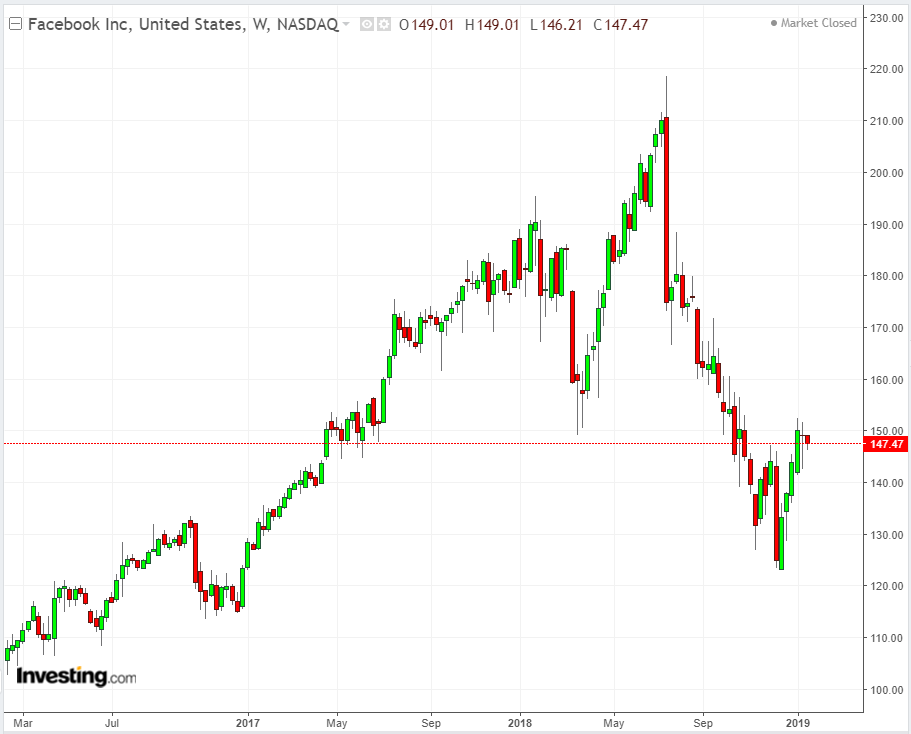- Reports Q4 2018 results on Wednesday, January 30, after the market close
- Revenue Expectation: $16.4 billion
- EPS Expectation: $2.19
For Facebook (NASDAQ:FB), 2018 was arguably the toughest year of its life as a publicly traded company. The social media giant was slammed by a variety of high-profile, worrying issues including data breaches, user privacy concerns and the political manipulation of its platform.
These blows not only forced founder and CEO Mark Zuckerberg to alter the business model that had previously produced eye-popping returns for shareholders, they also raise doubts about the company’s future potential. Indeed, the severity of these challenges is such that investors are almost certain politicians will be introducing regulations that will further stifle Facebook's growth and make it harder for all social media companies to monetize user data by selling their information to third parties.

These threats have taken quite a bit of steam out the high-flying stock, which closed yesterday at $147.47. That's a tumble of almost 33% from the $218.62 record high shares reached in July of last year.
Going forward, the biggest concern for investors is whether 2019 will bring additional uncertainty. Alternatively, might it be the year when user trust and Facebook's platform usage stabilizes? The company’s fourth-quarter earnings report and conference call, scheduled for January 30, should provide more insight on the situation.
Market expectations call for the company's earnings momentum to continue. Consensus believes that Facebook will post record revenue in the fourth quarter, which includes the holiday season and e-commerce bonanza days such as Black Friday and Cyber Monday. Sales are expected to surge 26% to $16.4 billion from a year ago, while earnings per share will have gained 52% to $2.19 for the same period, according analysts’ average estimates.
Nevertheless, in our view the threat of regulations will continue to pressure Facebook’s business model, keeping its share price depressed in the short-run. That means Mark Zuckerberg will continue to spend more money and deploy more resources in order to introduce changes to the company's digital properties, as a way of averting draconian controls.
The latest evidence of this came from a New York Times report late last week which disclosed that Zuckerberg is planning to integrate the chat tools on WhatsApp, Instagram and Facebook Messenger services, a move that could help the social media giant better tailor ads for users, and bolster its case against a breakup by regulators.
That uncertainty is already reflected in the Facebook’s share price, but any improvement going forward on both user growth and advertising revenue will fuel some gains in the stock's price. Though down from last year's highs, Facebook shares are already up almost 10% this year, outpacing the NASDAQ's 6% gain.
Despite all the negativity toward Facebook that was generated during 2018, there remains a significant bright spot: advertisers continue to find real value in the platform. As such, its dominant position in the digital ad market remains intact. According to a UBS Research, more than half of marketing dollars spent in the U.S. last year went to digital advertising, a segment that Google (NASDAQ:GOOGL) and Facebook continue to dominate.
Among Facebook’s social media properties, Instagram is doing particularly well. In the fourth quarter, ad dollars on Instagram surged 120% from the same period in 2017, according to Kenshoo Ltd., which coordinates digital marketing spending for other companies.
Bottom Line
At this juncture it’s difficult to call a bottom on Facebook's stock. The company is in the middle of its biggest transformation since its 2012 IPO. In addition, the threat of government regulations, Facebook’s internal changes and potentially slowing global growth are all key risks to Facebook's business going forward. These factors are likely to weigh on the company’s near-term growth and further delay a stock price recovery.
One factor that could potentially change that equation is Facebook’s ability to squeeze out yet more ad revenue at a time when growth in its daily active users in the U.S.and Canada is flattening. The company’s Q4 report could provide that surprise on Wednesday.
